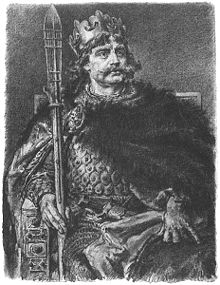Boleslaus the Brave
| Bolesław I the Brave | |
|---|---|
| King of Poland Duke of Bohemia |
|

Portrait by Jan Matejko.
|
|
| Reign | Duke: 992 – 18 April 1025 King: 18 April – 17 June 1025 |
| Coronation | 18 April 1025, Gniezno Cathedral, Poland. |
| Predecessor | Mieszko I |
| Successor | Mieszko II Lambert |
| Born | 967 Poznań |
| Died | 17 June 1025 (aged 58) Kraków? |
| Burial | Cathedral Basilica of Sts. Peter and Paul, Poznań |
| Wives |
|
| Issue Detail |
Bezprym Regelinda Mieszko II Lambert Otto |
| Dynasty | Piast |
| Father | Mieszko I of Poland |
| Mother | Dobrawa of Bohemia |
Bolesław I the Brave (Polish: Bolesław I Chrobry ![]() Polish , Czech: Boleslav Chrabrý; 967 – 17 June 1025), less often known as Bolesław I the Great (Polish: Bolesław I Wielki), was Duke of Poland from 992 to 1025, and the first King of Poland in 1025. As Boleslav IV, he was also Duke of Bohemia between 1002 and 1003. He was the son of Mieszko I of Poland by his wife, Dobrawa of Bohemia. According to a scholarly theory, Bolesław ruled Lesser Poland already during the last years of his father's reign. Mieszko I, who died in 992, divided Poland among his sons, but Bolesław expelled his father's last wife, Oda of Haldensleben, and his half-brothers and reunited Poland between 992 and 995.
Polish , Czech: Boleslav Chrabrý; 967 – 17 June 1025), less often known as Bolesław I the Great (Polish: Bolesław I Wielki), was Duke of Poland from 992 to 1025, and the first King of Poland in 1025. As Boleslav IV, he was also Duke of Bohemia between 1002 and 1003. He was the son of Mieszko I of Poland by his wife, Dobrawa of Bohemia. According to a scholarly theory, Bolesław ruled Lesser Poland already during the last years of his father's reign. Mieszko I, who died in 992, divided Poland among his sons, but Bolesław expelled his father's last wife, Oda of Haldensleben, and his half-brothers and reunited Poland between 992 and 995.
He supported the missionary views of Adalbert, Bishop of Prague, and Bruno of Querfurt. The martyrdom of Adalbert in 997 and his imminent canonization were used to consolidate Poland's autonomy from the Holy Roman Empire. This perhaps happened most clearly during the Congress of Gniezno (11 March 1000), which resulted in the establishment of a Polish church structure with a Metropolitan See at Gniezno. This See was independent of the German Archbishopric of Magdeburg, which had tried to claim jurisdiction over the Polish church. Following the Congress of Gniezno, bishoprics were also established in Kraków, Wrocław and Kołobrzeg, and Bolesław formally repudiated paying tribute to the Holy Roman Empire. Following the death of Holy Roman Emperor Otto III in 1002, Bolesław fought a series of wars against the Holy Roman Empire and Otto's cousin and heir, Henry II, ending in the Peace of Bautzen (1018).
...
Wikipedia
